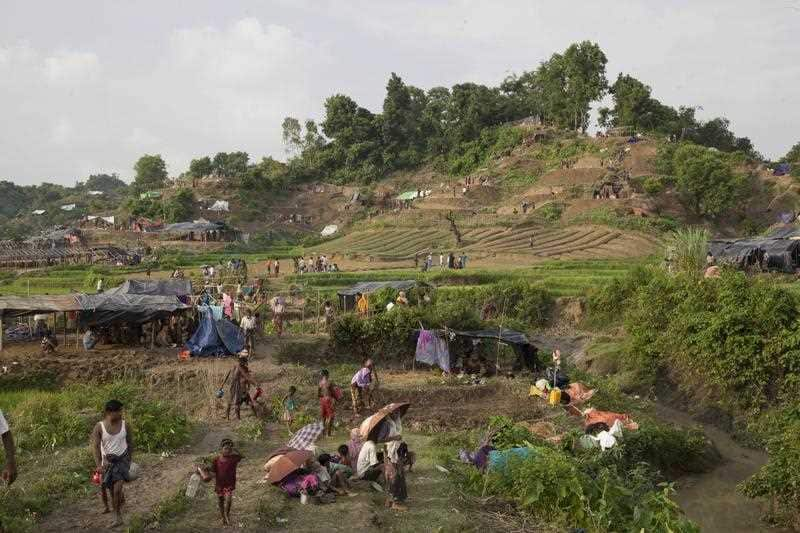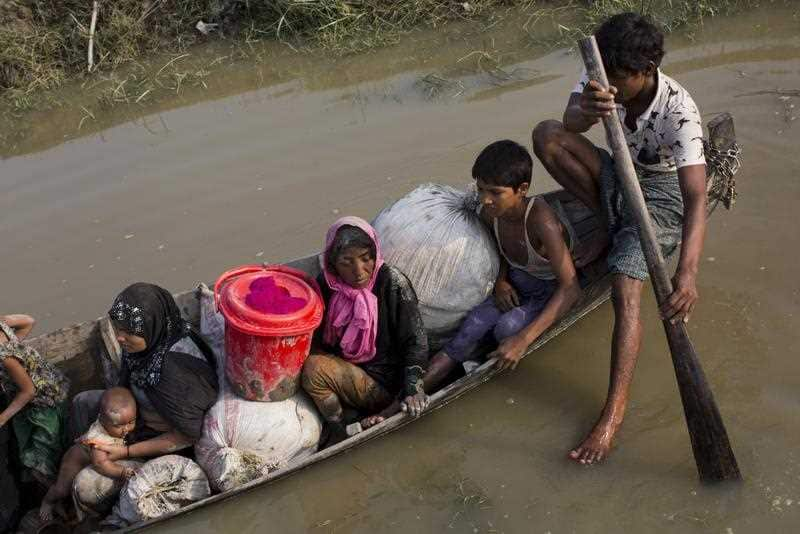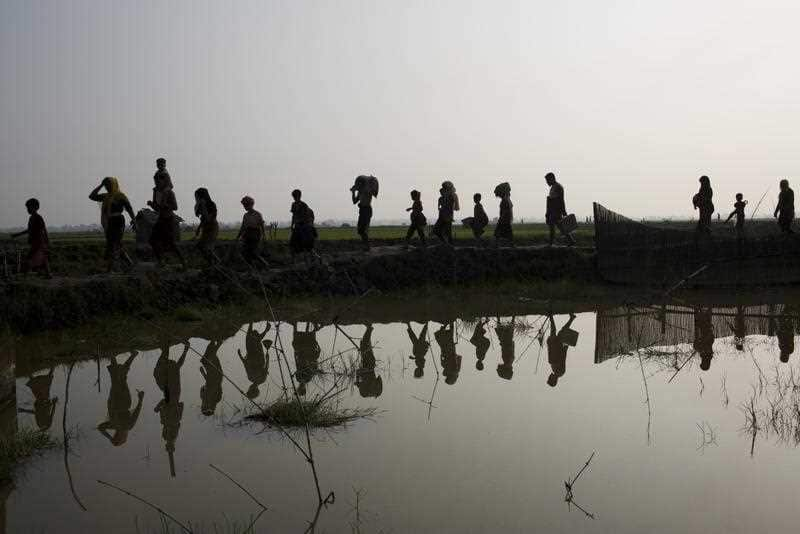The government sources believe the purpose of laying the landmines may have been to prevent the return of Rohingya Muslims fleeing violence.
Bangladesh will formally lodge a protest on Wednesday against the laying of landmines so close to the border, said the sources who had direct knowledge of the situation but asked not to be named because of the sensitivity of the matter.
An army crackdown triggered by an attack on August 25 by Rohingya insurgents on Myanmar security forces has led to the killing of at least 400 people and the exodus of nearly 125,000 Rohingya to neighboring Bangladesh, leading to a major humanitarian crisis.
“They are putting the landmines in their territory along the barbed-wire fence” between a series of border pillars, said one of the sources. Both sources said Bangladesh learned about the landmines mainly through photographic evidence and informers.
“Our forces have also seen three to four groups working near the barbed wire fence, putting something into the ground,” one of the sources said. “We then confirmed with our informers that they were laying landmines.”
The sources did not clarify if the groups were in uniform, but added that they were sure they were not Rohingya insurgents.
Manzurul Hassan Khan, a Bangladesh border guard officer, told Reuters earlier that two blasts were heard on Tuesday on the Myanmar side, after two on Monday fueled speculation that Myanmar forces had laid land mines.
One boy had his left leg blown off on Tuesday near a border crossing before being brought to Bangladesh for treatment, while another boy suffered minor injuries, Khan said, adding that the blast could have been a mine explosion.
A Rohingya refugee who went to the site of the blast on Monday - on a footpath near where civilians fleeing violence are huddled in a no man’s land on the border - filmed what appeared to be a mine: a metal disc about 10 centimetres in diameter partially buried in the mud. He said he believed there were two more such devices buried in the ground.
A Myanmar military source said landmines were laid along the border in the 1990s to prevent trespassing and the military had since tried to remove them, but none had been planted recently.
Two refugees also told Reuters they saw members of the Myanmar army around the site in the immediate period preceding the Monday blasts, which occurred around 2:25 p.m.
Reuters was unable to independently verify that the planted devices were land mines and that there was any link to the Myanmar army.
Myanmar army has not commented on the blasts near the border. Zaw Htay, the spokesman for Myanmar’s national leader, Aung San Suu Kyi, was not immediately available for comment.
On Monday, he told Reuters clarification was needed to determine “where did it explode, who can go there and who laid those land mines. Who can surely say those mines were not laid by the terrorists?”
A Myanmar military source said landmines were laid along the border in the 1990s to prevent trespassing and the military had since tried to remove them, but none had been planted recently.

Suu Kyi under pressure
Myanmar’s Aung San Suu Kyi blamed “terrorists” on Wednesday for “a huge iceberg of misinformation” on the violence in Rakhine state, but made no mention of the nearly 125,000 Rohingya Muslims who have fled over the border to Bangladesh since August 25.
She has been accused by Western critics of not speaking out for the minority that has long complained of persecution, and some have called for the Nobel Peace Prize she won in 1991 as a champion of democracy to be revoked.
The leader of the Buddhist-majority country has come under pressure from countries with Muslim populations over the crisis, and on Tuesday UN Secretary-General Antonio Guterres warned of the risk of ethnic cleansing and regional destabilisation.
In a rare letter expressing concern that the violence which has raged for nearly two weeks in the north-eastern state could spiral into a “humanitarian catastrophe”, Guterres urged the UN Security Council to press for restraint and calm.
Myanmar says its security forces are fighting a legitimate campaign against “terrorists” responsible for a string of attacks on police posts and the army since last October.
Myanmar officials blame Rohingya militants for the burning of homes and civilian deaths. But rights monitors and Rohingya fleeing to neighbouring Bangladesh say the Myanmar army is trying to force them out with a campaign of arson and killings.
Reuters reporters saw hundreds more exhausted Rohingya arriving on boats near the Bangladeshi border village of Shamlapur on Tuesday, suggesting the exodus was far from over.

The new arrivals – many sick or wounded – have strained the resources of aid agencies and communities already helping hundreds of thousands of refugees from previous spasms of violence in Myanmar.
Vivian Tan, a spokeswoman for the U.N. refugee agency, UNHCR, said one camp in Bangladesh, Kutupalong, had reached “full capacity” and resources at others were being stretched.
‘Facing genocide’
Suu Kyi spoke by telephone on Tuesday with Turkish President Tayyip Erdogan, who has pressed world leaders to do more to help a population of roughly 1.1 million he says are facing genocide.
In a statement issued by her office on Facebook, Suu Kyi said the government had “already started defending all the people in Rakhine in the best way possible” and warned against misinformation that could mar relations with other countries.
She referred to tweets of images of killings posted by Turkey’s deputy prime minister that he later deleted because they were not even from Myanmar.
“She said that kind of fake information which was inflicted on the deputy prime minister was simply the tip of a huge iceberg of misinformation calculated to create a lot of problems between different countries and with the aim of promoting the interests of the terrorists,” the social media statement said.
Humanitarian assistance
The latest violence in Rakhine state began 12 days ago when Rohingya insurgents attacked dozens of police posts and an army base. The ensuing clashes and a military counter-offensive have killed at least 400 people and triggered the exodus of villagers to Bangladesh.
The International Organisation for Migration said humanitarian assistance needed to increase urgently and that it and partner agencies had an immediate funding gap of $18 million over the next three months to boost lifesaving services for the new arrivals.

The latest estimate of the numbers that have crossed into Bangladesh, based on calculations by UN workers, is 123,600.
That takes to about 210,000 the number of Rohingya who have sought refuge in Bangladesh since last October, when Rohingya insurgents staged smaller attacks on security posts, triggering a major Myanmar army counter-offensive.

